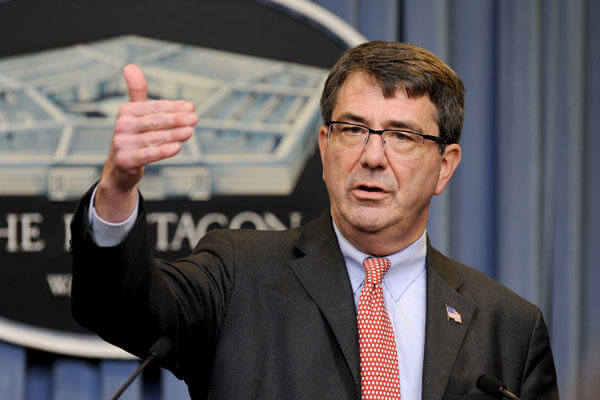The U.S. defense chief has ordered the Defense Department to suspend the collection of bonuses improperly awarded to California National Guard members.
In a statement on Wednesday, Carter said he ordered the Pentagon's Defense Finance and Accounting Service "to suspend all efforts to collect reimbursement from affected California National Guard members, effective as soon as is practical. This suspension will continue until I am satisfied that our process is working effectively."
The announcement came a day after President Barack Obama told the department to expedite its review of the matter.
Roughly 10,500 service members, mostly from the California National Guard, improperly received bonuses of as much as $15,000 and other incentives to serve in the ranks a decade ago during the peak of the U.S.-led wars in Iraq and Afghanistan, officials have said.
Thousands of troops were later ordered to pay back the money or face such penalties as interest charges and tax liens, according to a story first reported by David Cloud, a reporter for The Los Angeles Times.
Carter acknowledged soldiers "may have received incentive bonuses and tuition assistance improperly as a result of errors and in some cases criminal behavior by members of the California National Guard. While some soldiers knew or should have known they were ineligible for benefits they were claiming, many others did not."
He added that about 2,000 Guard members "have been asked, in keeping with the law, to repay erroneous payments."
Since the story broke on Saturday, lawmakers and members of the public have reacted with outrage over the Pentagon's bonus repayment policy. Members of Congress have criticized the repayment policy as "boneheaded" and called on the department to forgive the debt.
"It remains my firm belief that even the simple request of asking soldiers to repay money contingent on reenlistment is disgraceful and insulting," Rep. Duncan Hunter, a Republican from California and former Marine who served in Iraq and Afghanistan, wrote in a letter on Monday to Carter. "In fact, I find it difficult to believe that either you or your leadership team was aware that such a boneheaded decision was made to demand repayment."
Rep. Jeff Miller, a Republican from Florida and chairman of the House Veterans Affairs Committee, on Wednesday blasted Carter's announcement as "a weak and ham-handed attempt to shift the focus away from the Obama administration’s shameful treatment of service members and veterans."
The Obama administration "had no problem recouping bonuses from soldiers who served honorably but has time and again let misbehaving Department of Veterans Affairs employees keep lavish cash rewards they didn’t deserve," Miller added. "Once again, it seems Congress will be forced to fix a problem that the Obama administration created but refuses to fully address on its own.”
Pentagon and Guard officials have said there is no quick fix to the problem because current laws and regulations don't authorize them to grant a blanket waiver. They have also pointed the finger at Congress, saying they first requested legislation to help deal with the issue in 2014. Similar language was included in the fiscal 2017 defense bill, which hasn't yet been approved.
Carter cited his responsibility to honor troops' "service and sacrifice" in announcing his steps to address the controversy.
"I want to be clear: this process has dragged on too long, for too many service members," he said. "Too many cases have languished without action. That's unfair to service members and to taxpayers. The steps I've outlined are designed to meet our obligations to both, and to do so quickly.
A team led by Peter Levine, Carter's senior personnel official, by Jan. 1 will create a new process "that ensures the fair and equitable treatment of our service members and the rapid resolution of these cases," with the goal of concluding the work by July 1.
In a press conference at the Pentagon later in the day, Levine said the department doesn't intend to alter the process for review and appeals of the cases of those service members affected, but rather will speed up the process itself.
"Each case is going to need to be evaluated on its own merits," he said.
The department will devote the resources to resolve cases more quickly, so a process that could take years will be completed in months, Levine said.
"What we're envisioning is a temporary process" to handle existing cases and provide "one-stop shopping for service members affected by this," he said. The intent was to make whole "those who were caught up in this through no fault of their own," he added, and the department will "lean in favor of the soldier" in deciding difficult scenarios.
While the bulk of the affected service members were in the California National Guard, "dozens" of cases exist in other states, Levine said. He didn't provide an initial estimate on how many cases were outside California and didn't name the other states.
Andreas Mueller, the chief of federal policy for the California Guard, has described the problem as "a national issue and affects all states," the Los Angeles Times reported.
Meanwhile, the Pentagon won't seek legislation to create a blanket waiver for all cases, Levine said. "We don’t believe we need legislation," he said. "It would set a bad precedent if we don't recoup" money from service members who abused the system to get bonuses, he said. "There are cases where we need to recoup."
It stil wasn't clear how cases will be resolved. As it stands now, the options include fixing the record, obtaining an exception to policy, getting the debt waived, or repaying. It also wasn't clear how or whether the soldiers and veterans who either repaid the money or started the repayment process will be reimbursed.
Speaking to defense reporters earlier Wednesday in Washington, D.C., Air Force Gen. Joseph Lengyel, chief of the National Guard Bureau, acknowledged the existing process for an affected service member to navigate can be cumbersome.
Indeed, a single case could involve a service member filing paperwork with at least four entities, including the Army National Guard, Defense Finance and Accounting Services, Defense Office of Hearings and Appeals, and Board for Corrections of Military Records, Lengyel said.
"There is a process to deal with erroneously awarded" benefits, but it takes time partly because the incentives ranged from enlistment bonuses to school repayment programs, which involve different types of contracts and in some cases are paid directly to financial institutions, Lengyel said.
Problems with the Guard bonuses first surfaced in 2008 after former Army Master Sgt. Toni Jaffe took over management of the Guard's bonus and incentive programs, Lengyel said.
Jaffe in 2012 was sentenced to 30 months in prison after pleading guilty to filing $15.2 million in false and fraudulent claims, according to the Justice Department. Eight onetime Guard members were indicted on charges in 2014 of fraudulently obtaining recruiting referral bonuses, the Associated Press has reported.
Lengyel said the Guard reviewed about 13,000 cases and estimated the total amount of bonus money involved at between $40 million and $50 million. While that's higher than previous estimates, it amounts to less than one-hundredth of 1 percent of Pentagon's proposed fiscal 2017 budget of $583 billion.
Lengyel blamed the scandal on the lack of oversight, which has plagued other military recruiting efforts.
The Pentagon in 2015 was criticized for "paid patriotism" after paying the NFL and other sports organizations millions of dollars to recognize troops during events, according to Bloomberg News. And the National Guard in 2014 suspended its sponsorship of NASCAR events after spending tens of millions of dollars on the effort with questionable recruiting results, according to USA Today.
The department has forced other recipients, including civilians, to repay bonus money. Earlier this year, the Pentagon's bomb squad team was saddled with debt due to an accounting error. One member of the team committed suicide. The department agreed to forgive the debt after Military.com and The Washington Post reported on the case.
-- Richard Sisk contributed to this report.
-- Oriana Pawlyk can be reached at oriana.pawlyk@military.com. Follow her on Twitter at @Oriana0214.
-- Brendan McGarry can be reached at brendan.mcgarry@military.com. Follow him on Twitter at @Brendan_McGarry.




























